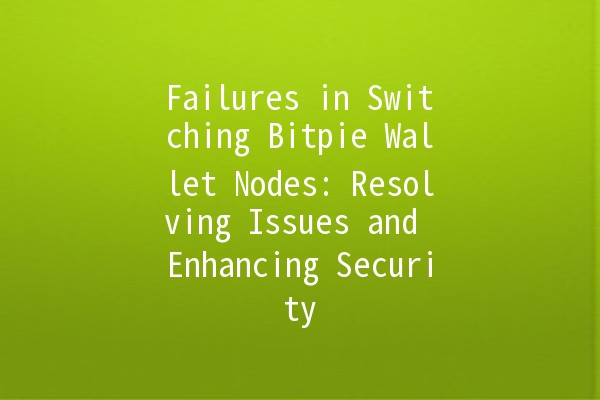




In the rapidly evolving world of cryptocurrency, wallets play a vital role in securing assets. Bitpie Wallet, known for its functionality and userfriendly interface, occasionally faces issues related to node switching. This article provides insights into why node switching might fail, practical solutions to troubleshoot these issues, and tips for enhancing wallet security.
Node switching refers to the process of changing the server your wallet connects to for verification and transaction processing. This is crucial as the stability and performance of your wallet can depend on the reliability of the nodes you connect to.
Network Issues: Incidents such as high latency or connection timeouts can hinder communication with the nodes.

Node Configuration: Improperly configured nodes or outdated software on the wallet can lead to failure in switching.
Limitations of Service: Some nodes may be overloaded with requests leading to temporary downtime.
Explanation: Ensure your internet connection is stable. A weak connection can impede the wallet's ability to communicate with nodes.
Application: Regularly test your network speed and reliability. Use tools like ping to check latency to various node addresses.
Explanation: Keeping your wallet updated is crucial as updates often come with bug fixes and performance improvements.
Application: Regularly check for updates in the app store or within the wallet settings, ensuring you have the latest version.
Explanation: Sometimes, the automatic node selection fails. Manually entering a reliable node can resolve this.
Application: Research reputable nodes within the cryptocurrency community and update your wallet's node settings accordingly.
Explanation: Blockchain explorers can provide insights into the health of various nodes.
Application: Use explorers to monitor node performance before switching. This ensures you're connecting to a functioning node.
Explanation: The cryptocurrency community is a great resource for troubleshooting issues.
Application: Utilize forums, social media groups, or direct support channels to seek advice from experienced users when facing persistent node issues.
While resolving node switching failures is essential, securing your wallet against potential threats is equally important.
Explanation: Twofactor authentication adds an additional layer of security.
Application: Activate 2FA in Bitpie to ensure that even if someone gains access to your account, they cannot easily log in without the second verification step.
Explanation: Weak passwords are the most common vulnerability.
Application: Create complex passwords combining letters, numbers, and symbols. Utilize password managers for secure storage.
Explanation: Backing up your wallet ensures you can recover your information if needed.
Application: Utilize the backup functions available in your wallet settings and store the backup in secure locations.
Explanation: Regularly monitoring your transactions prevents unauthorized access.
Application: Set aside time weekly to review your transaction history within the Bitpie wallet.
Explanation: Being informed about cryptocurrency security helps in protecting your assets.
Application: Read articles, join courses, or attend webinars on cryptocurrency and wallet security practices.
Solution: Switch to a less busy node or check your network speed.
Solution: Ensure your wallet software is updated and check for interference from other applications.
Solution: Confirm the node addresses are correctly entered and operational by checking in forums or community boards.
Solution: Look up specific error codes online or contact customer service.
Solution: This may indicate software issues; check for updates and consider reinstalling the app.
You can answer this by monitoring the node’s response time and conducting regular checks through blockchain explorers. Community forums often provide feedback on node reliability, which can further assist you.
If node switching fails persistently, consider alternate configurations, refer to the troubleshooting section of your wallet manual, or contact customer support for specialized assistance.
Yes, switching to a slower or heavily burdened node can significantly impact transaction processing times. Opt for nodes known for better performance to ensure swift transactions.
Frequent switching can increase exposure to potential risks. However, maintaining a connection to wellknown and reliable nodes should mitigate these risks.
Document your experiences with each attempt and reach out to Bitpie customer support via their official channels for guidance and resolutions.
Always choose nodes that are frequently updated and supported by reputable developers. Engaging actively with communities can provide insights into which nodes are deemed safe and reliable.
In today’s fastpaced cryptocurrency landscape, it's essential to understand how to efficiently manage your wallet's technical aspects. Implementing these practical tips can not only aid in resolving current issues with node switching in Bitpie Wallet but also enhance your overall security and experience. With the right knowledge and support, you can navigate the complexities of cryptocurrency storage effectively.